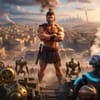The concept of creating artificial life has fascinated humans for centuries, from ancient myths to modern technological advancements. In Greek mythology, Hephaestus, the god of the forge, created mechanical servants and automata, sparking the imagination of generations.
Fast-forward to the present day, and we find ourselves in the midst of an AI revolution. Artificial intelligence has enabled us to create machines that can think, learn, and act autonomously, blurring the lines between science fiction and reality.
The journey from Hephaestus's forge to the age of AI has been long and winding, marked by significant milestones and innovations. As we continue to push the boundaries of what's possible with AI, we're forced to confront fundamental questions about the nature of life, intelligence, and human existence.
By exploring the evolution of mechanical life, we can gain a deeper understanding of the complex relationships between technology, society, and human values. As AI continues to shape our world, it's essential to consider the implications of creating machines that think and act like humans.


